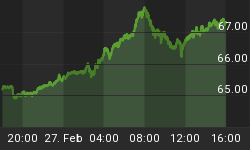The fear of deflation has become the cornerstone of Keynesian economic thought. A lack of inflation has been used to explain periods of economic weakness from the Great Depression of the 1930's, to the Great Recession 2008-2009. And now, that philosophy has been adopted as gospel by those that control the Federal Reserve and virtually every central bank on the planet.
In reality deflation is cathartic, and a necessary condition to heal the economy. If deflation were allowed to naturally run its course, as it did in the brief Depression of 1920-21, depressions would be sharp but fairly short in duration. And the economy would find itself on firm footing fairly quickly. However, Keynesians view deflation as the source of a destructive cycle in which; asset prices plunge, companies cut jobs, spending plummets, and a permanent recession sets in. Therefore, the prevailing current view maintains that deflation is something that needs immediate intervention of massive monetary stimulus--you can say they have become deflation phobic.
This is why I find it fascinating that Keynesians, who proliferate in central banks and in the financial media, are relentlessly cheerleading the recent spate of deflationary data. And, just to be clear, deflation has not been limited to the New England Patriots' footballs--it is everywhere you look.
However, it is the height of hypocrisy that Keynesians use the specter of deflation to frighten us into believing we need to endlessly dilute the value of our currencies and take the rate on our savings to zero percent. But then, at the same time, take every data point that points to falling prices as another reason to be bullish on markets and the economy. Their mantras are: Lower commodity prices--a boost to the consumer, plunging interest rates--an increase in mortgage refinancing, I actually heard a commentator suggest crumbling copper prices were a boon to minting pennies--he obviously didn't realize pennies have been minted mostly with zinc since 1983.
How can Keynesians celebrate deflation, while at the same time use it to scare us into accepting ZIRP forever? The easy answer would be, they are cheerleaders for the stock market...and I believe they are. But a more compelling reason is these individuals have convinced themselves that a group of 12 academics can arrive at better conclusions than the free market. So enamored are they by the collective wisdom of our men and women who occupy the Federal Reserve, that they can't bring themselves to imagine there may be some unforeseen negative consequences to their actions. And, because for a moment it appeared as though the Fed would have a graceful exit from QE, their blind faith in micromanagement of markets appeared to be warranted.
Keynesians are unable to acknowledge that printing and borrowing money has simply been a failure in bringing sustainable and vibrant growth back to economies.
Unfortunately, we are just beginning to experience the pain associated from believing central banks can obliterate the free market pricing of stocks, bonds, commodities and currencies for seven years with impunity. Most importantly, there is an inherent danger in basing investment decision on the capriciousness of a handful of individuals, as opposed to economic fundamentals and markets.
For example, Mario Draghi is doing his best imitation of the Fed and the Bank of Japan in promising to buy at least 1.1 trillion euros worth of public and private debt over the course of the next year and a half.
However, much like in the U.S. and Japan, Europeans will find that monetizing debt will do little in the way of engendering growth; but will be remarkably successful in destroying the purchasing power of the middle class.
The ECB's bid to monetization massive amounts of Eurozone sovereign debt won't rescue the economy or do much in the way of creating inflation. This is because sovereign bond yields are already close to zero percent, and even have negative yields in some cases. Once the ECB buys debt from private banks they will likely sit on most of that new central bank credit. Why would private banks buy new government bonds that offer no interest and have tremendous downside risks to the premiums? And why take the risk of making new loans to unqualified borrowers when the interest rate they can charge in nearly zero percent?
In fact, the private banks that already front ran the ECB's bid could very well just unwind their positions to Mr. Draghi and then sit on that cash. And the hopes of "saving" the European economy from the disastrous fallout of deflation will go down in history as yet another failure of central banks to manipulate markets.
Central bankers tend to be duplicitous and incompetent plutocrats. Investors would be far better off placing their faith in markets and real money instead of fiat currencies and empty promises. Of course, this misplaced faith will eventually lead to the biggest shock of all...the soon to arrive collapse of paper currencies and the insolvent sovereign debt backed by central banks.
Michael Pento produces the weekly podcast "The Mid-week Reality Check", is the President and Founder of Pento Portfolio Strategies and Author of the book "The Coming Bond Market Collapse."















